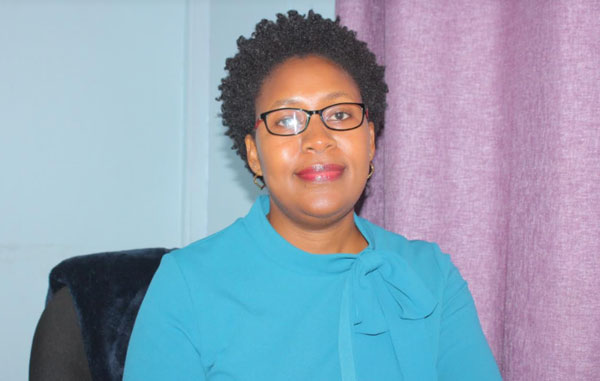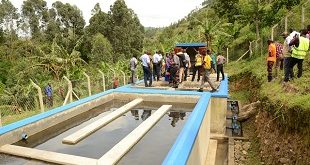
Kampala, Uganda | THE INDEPENDENT | In a bold and compassionate move, a Ugandan woman is embarking on a groundbreaking journey to establish a surrogacy facility in Uganda, aiming to provide hope and happiness to families struggling with fertility challenges. Dorothy Kyomugasho Musimenta the visionary behind this initiative, is set to revolutionize the surrogacy landscape in Uganda.
The 40-year-old mother of four is an advocate for surrogacy parenting, with a deep passion for reproductive rights and family-building and is determined to address the pressing need for comprehensive surrogacy services in Uganda. With infertility affecting countless individuals and couples across the nation, her vision is to offer a safe and ethical solution for those dreaming of becoming parents.
“During our Informal women’s meetings, frustrating conversations intimated on how some of our friends are struggling to solve the infertility problem, make one want to shed a tear,”- Musimenta says.
For Musimenta, this endeavour is not just a business venture but a calling rooted in her own experiences and empathy for others facing similar challenges. Having witnessed close friends and family members struggle with infertility, she understands the emotional and financial toll it can take on individuals and relationships.
“I have had testimonies from friends whose marriages are unstable, and on the verge of collapse, others have indeed collapsed because of infertility constraining them from bearing children naturally,” she adds.
In an exclusive interview, she shared her motivation: “I’ve seen the heartache that infertility can bring, and I believe that everyone deserves the chance to experience the joy of parenthood. My dream is to create a facility that provides world-class surrogacy services right here in Uganda, offering hope and happiness to our fellow citizens,”
“A friend of mine once called me crying that her husband was leaving her because she couldn’t bear children. They had tried all the fertility treatments but they all failed because the truth is she is infertile. I picked interest and I thought about how many more women were going through similar situations quietly,”
Surrogacy is an arrangement, often supported by a legal agreement, whereby a woman agrees to bear a child for another person or persons, who will become the child’s parent(s) after birth.
There are two types of surrogacies: partial (genetic), and full (gestational). With partial surrogacy, the surrogate mother is also the genetic mother of the child, and conception usually occurs by artificial insemination using the commissioning father’s sperm. With full surrogacy, the commissioning couples are the genetic parents of the child and conception takes place at a clinic through IVF.
Surrogacy is highly practised at most fertility centres around the country. Most fertility centres advertise when they need surrogates or womenwalk into the centres and ask to become surrogates.
Establishing a surrogacy facility in Uganda comes with its unique set of challenges, including legal and ethical considerations. While surrogacy is not explicitly regulated in Ugandan law, Musimenta is committed to working closely with legal experts, ethicists, and healthcare professionals to ensure that the facility operates within a clear and ethical framework.
Last year in November, Tororo Woman MP Sarah Opendi secured leave of parliament to introduce the Surrogacy and Assisted Reproductive Technology Bill.
The Surrogacy and Assisted Reproductive Technology Bill intends to make legal provisions for surrogate mothers, prohibition of certain practices in connection with embryos and gametes as well as the establishment of a committee under the Uganda Medical and Dental Practitioners Council to make provision for their function.
The Bill proposes remedies to regulate the environment for couples who are unable to have children owing to infertility, women who want to single mother a child, as well as couples with issues with genetic makeup to have children. The proposed law will look at sperm donors and legalities to do with surrogacy among others.
Opendi, who is a former Minister of Health in charge of General duties, said that although different mechanisms of getting children through the participation of other partners are already happening in the country, it is unregulated. She says that the law will protect surrogate mothers among others and children born out of surrogacy.
Musimenta says that as they await legislators to sign the bill into law, she plans to engage with local healthcare providers, advocacy groups, and potential clients to foster understanding and acceptance of surrogacy as a legitimate family-building option. Her goal is to create a nurturing and inclusive environment where surrogates, intended parents, and their families feel supported and empowered throughout their journey.
“I hope when we make the public more interested in the venture, it will also compel legislators to finally pass the bill. It has been long overdue,”
She says she embarks on this transformative journey; the Ugandan surrogacy landscape stands on the cusp of significant change. Her vision extends beyond simply establishing a facility; it’s about reshaping societal attitudes, breaking down stigma, and ensuring that the dream of parenthood becomes a reality for many.
“We need to create sensitization and awareness as many Africans don’t believe in this. They think it is an exotic thing. We need to change people’s mindsets. Infertility has many solutions but we are just not exploring them,”
Her mission to bring surrogacy services to Uganda reflects her unwavering commitment to empowering individuals and couples to achieve their dreams of parenthood. As the nation watches with anticipation, her vision holds the promise of changing lives and breaking down the barriers that have stood in the way of Ugandans seeking the joys of parenthood.
 The Independent Uganda: You get the Truth we Pay the Price
The Independent Uganda: You get the Truth we Pay the Price



Surrogacy is not an acceptable solution
Please protect women and children from this
If you want to talk about this with us, we will be happy
http://declaration-surrogacy-casablanca.org
Your opinions are respected. However, where is the crime.. if the whole engagement is acceptable to the parties involved withing a binding contract.
Asante Sana Dorothy, K. M, friends from US and UK were sharing good news @SurrogacyParenting Ug. Looking forward to support this initiative.
We could try to understand your school of thought, however there is need to respect other families which are willing to have children the right way from their own genes, Thanks to Kenya that respects these rights. Thanks.
Thanx David. For the objective mind.